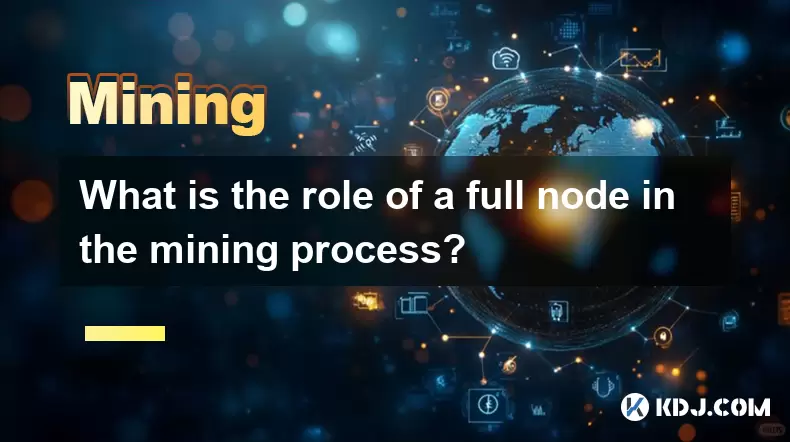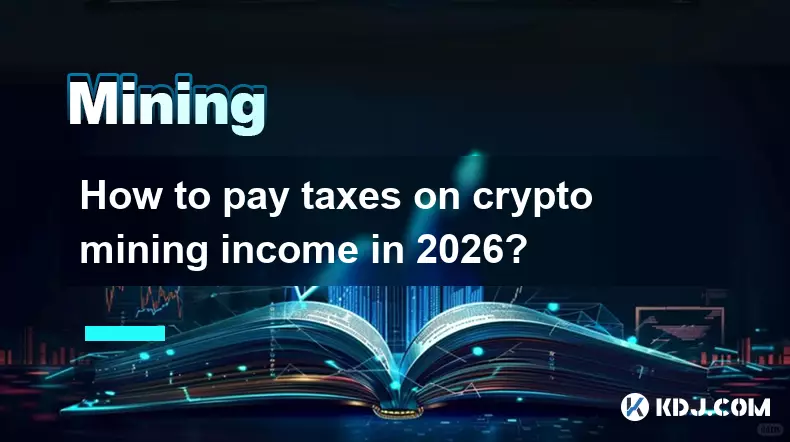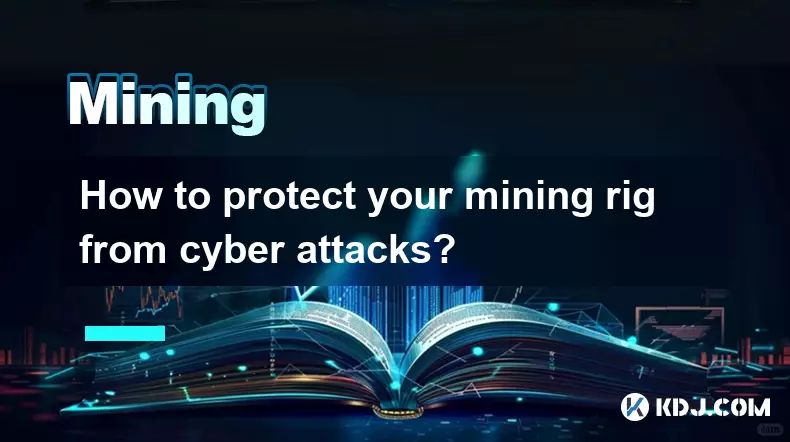-
 bitcoin
bitcoin $87959.907984 USD
1.34% -
 ethereum
ethereum $2920.497338 USD
3.04% -
 tether
tether $0.999775 USD
0.00% -
 xrp
xrp $2.237324 USD
8.12% -
 bnb
bnb $860.243768 USD
0.90% -
 solana
solana $138.089498 USD
5.43% -
 usd-coin
usd-coin $0.999807 USD
0.01% -
 tron
tron $0.272801 USD
-1.53% -
 dogecoin
dogecoin $0.150904 USD
2.96% -
 cardano
cardano $0.421635 USD
1.97% -
 hyperliquid
hyperliquid $32.152445 USD
2.23% -
 bitcoin-cash
bitcoin-cash $533.301069 USD
-1.94% -
 chainlink
chainlink $12.953417 USD
2.68% -
 unus-sed-leo
unus-sed-leo $9.535951 USD
0.73% -
 zcash
zcash $521.483386 USD
-2.87%
What is the role of a full node in the mining process?
A full node independently validates blockchain transactions and blocks, ensuring network security and decentralization by enforcing consensus rules without relying on third parties.
Jul 20, 2025 at 10:14 am

Understanding the Role of a Full Node in Blockchain
In the world of cryptocurrency, the term full node often appears when discussing blockchain operations and mining. A full node is a program that fully validates transactions and blocks on a blockchain network. Unlike lightweight nodes, which rely on other nodes to verify data, a full node independently verifies all aspects of the blockchain. This independence ensures that no single entity can manipulate the system or alter transaction history without consensus.
Running a full node requires significant storage space and bandwidth because it stores a complete copy of the blockchain. For example, the Bitcoin blockchain exceeds several hundred gigabytes in size, and it continues to grow as new blocks are added. Despite these requirements, many users choose to run full nodes to contribute to network security and decentralization.
How Full Nodes Support Mining Operations
Mining involves solving complex cryptographic puzzles to validate transactions and add them to the blockchain. While miners use specialized hardware like ASICs or GPUs to perform computations, they still rely on the underlying infrastructure provided by full nodes. These nodes ensure that only valid transactions are included in the blocks being mined.
When a miner constructs a block, they must first gather transactions from the mempool—a collection of unconfirmed transactions. A full node provides this mempool data and validates each transaction before it's included in a candidate block. Without accurate validation from a full node, miners could unknowingly include invalid transactions, leading to wasted computational resources and potential rejection of their mined blocks.
Additionally, after a block is mined, it must be broadcast across the network for verification. Full nodes play a critical role in propagating this information quickly and accurately. They relay the newly mined block to other nodes, ensuring rapid dissemination and minimizing forks or orphaned blocks.
Differences Between Full Nodes and Mining Rigs
It’s essential to distinguish between full nodes and mining rigs, as they serve different functions within the blockchain ecosystem. A mining rig focuses solely on performing hash calculations to discover new blocks, while a full node handles transaction validation, block propagation, and consensus enforcement.
Miners typically do not run full nodes themselves due to resource constraints. Instead, they connect to mining pools or remote full nodes via protocols like Stratum or GBT (GetBlockTemplate). These protocols allow miners to receive updated block templates and submit their work without maintaining a full copy of the blockchain.
However, relying on third-party nodes introduces centralization risks. If most miners depend on a small number of nodes, those nodes gain disproportionate influence over the network. Running a full node locally enhances trustlessness and reduces dependency on external entities.
Setting Up a Full Node for Mining Support
To set up a full node that supports mining activities, follow these steps:
- Ensure your machine meets the minimum hardware requirements: at least 500GB of SSD storage, 4GB of RAM, and a stable internet connection.
- Download the official wallet software or node client for your chosen cryptocurrency, such as Bitcoin Core for Bitcoin.
- Configure the node to enable features like blockchain pruning or transaction indexing if needed for mining integration.
- Allow incoming connections through your firewall and configure port forwarding on your router to improve connectivity with other nodes.
- Start syncing the blockchain—this may take several hours or even days depending on your internet speed and hardware performance.
- Once synced, connect your mining software to the local node using appropriate RPC credentials and settings.
By completing these steps, you create a trusted source of blockchain data that your mining operation can rely on without intermediaries.
The Impact of Full Nodes on Network Security
The presence of numerous full nodes strengthens the overall security of a blockchain network. Each full node acts as an independent auditor, checking every transaction and block against the protocol rules. This redundancy makes it extremely difficult for malicious actors to introduce fraudulent activity into the chain.
If someone attempts to modify historical data or double-spend coins, the majority of full nodes will reject the invalid changes, preserving the integrity of the ledger. Furthermore, full nodes help prevent denial-of-service attacks by distributing traffic evenly across the peer-to-peer network.
Decentralized governance also benefits from widespread full node adoption. Users who run full nodes participate indirectly in decision-making processes related to protocol upgrades or forks. Their ability to enforce consensus rules gives them voting power through continued support of specific chains.
Frequently Asked Questions
What happens if I stop running my full node?Stopping your full node means you no longer contribute to transaction validation or block propagation. Other participants may experience slightly slower synchronization times, but the network remains unaffected unless many nodes go offline simultaneously.
Can I mine directly from a full node?No, mining requires dedicated software and hardware optimized for high-speed hashing. However, you can connect mining software to a full node to fetch block templates and submit shares securely.
Is there any incentive for running a full node?Currently, most networks do not offer direct financial incentives for operating a full node. The primary motivations are supporting decentralization, improving personal security, and gaining deeper insight into blockchain mechanics.
Do full nodes consume a lot of bandwidth?Yes, full nodes frequently exchange data with peers, especially during initial synchronization and high-traffic periods. Expect usage ranging from tens to hundreds of gigabytes per month depending on network activity and configuration settings.
Disclaimer:info@kdj.com
The information provided is not trading advice. kdj.com does not assume any responsibility for any investments made based on the information provided in this article. Cryptocurrencies are highly volatile and it is highly recommended that you invest with caution after thorough research!
If you believe that the content used on this website infringes your copyright, please contact us immediately (info@kdj.com) and we will delete it promptly.
- Bitcoin Blunder: Crypto Firm Bithumb's Massive Mistaken Transfer Sparks User Compensation and Regulatory Scrutiny
- 2026-02-08 07:35:01
- Ripple's XRP Ledger Set to Revolutionize Finance with Lending Protocols and Confidential Transactions
- 2026-02-08 07:20:02
- Bitcoin's Taker Ratio Signals Deep Bearish Sentiment Amidst Market Turmoil
- 2026-02-08 07:35:01
- KDN Fuels Klardven's DeFi Ascent: Demand Soars, FOMO Follows in a Maturing Market
- 2026-02-08 07:20:02
- Coinbase Liquidations Jolt Crypto Loan Market: A Systemic Shock on the Horizon?
- 2026-02-08 07:15:01
- Big Game Buzz: BetMGM Bonus & COVERS Unlock Massive Coin Toss Wagers
- 2026-02-08 07:15:01
Related knowledge

How to mine crypto sustainably in 2026?
Feb 07,2026 at 04:20pm
Energy Source Optimization1. Miners increasingly deploy solar arrays directly on warehouse rooftops to power ASIC rigs during daylight hours. 2. Geoth...

How to mine Conflux on a standard gaming laptop?
Feb 07,2026 at 04:19am
Hardware Requirements for Conflux Mining1. Conflux uses a proof-of-work consensus mechanism called Tree-Graph, which is designed to be ASIC-resistant ...

How to mine Flux with a 30-series Nvidia GPU?
Feb 07,2026 at 02:40pm
Market Volatility Patterns1. Bitcoin price movements often exhibit sharp intraday swings exceeding 5% during low-liquidity windows, particularly betwe...

How to pay taxes on crypto mining income in 2026?
Feb 07,2026 at 01:20am
Tax Classification of Mining Rewards1. Cryptocurrency received as mining rewards is treated as ordinary income by most major tax jurisdictions includi...

How to find the lowest fee mining pools for BTC?
Feb 07,2026 at 01:00pm
Fee Structure Transparency1. Most reputable BTC mining pools publish their fee schedules directly on their official websites, often under sections lab...

How to protect your mining rig from cyber attacks?
Feb 05,2026 at 09:40pm
Secure Firmware Updates1. Always verify the digital signature of firmware before installation to ensure authenticity and integrity. 2. Disable automat...

How to mine crypto sustainably in 2026?
Feb 07,2026 at 04:20pm
Energy Source Optimization1. Miners increasingly deploy solar arrays directly on warehouse rooftops to power ASIC rigs during daylight hours. 2. Geoth...

How to mine Conflux on a standard gaming laptop?
Feb 07,2026 at 04:19am
Hardware Requirements for Conflux Mining1. Conflux uses a proof-of-work consensus mechanism called Tree-Graph, which is designed to be ASIC-resistant ...

How to mine Flux with a 30-series Nvidia GPU?
Feb 07,2026 at 02:40pm
Market Volatility Patterns1. Bitcoin price movements often exhibit sharp intraday swings exceeding 5% during low-liquidity windows, particularly betwe...

How to pay taxes on crypto mining income in 2026?
Feb 07,2026 at 01:20am
Tax Classification of Mining Rewards1. Cryptocurrency received as mining rewards is treated as ordinary income by most major tax jurisdictions includi...

How to find the lowest fee mining pools for BTC?
Feb 07,2026 at 01:00pm
Fee Structure Transparency1. Most reputable BTC mining pools publish their fee schedules directly on their official websites, often under sections lab...

How to protect your mining rig from cyber attacks?
Feb 05,2026 at 09:40pm
Secure Firmware Updates1. Always verify the digital signature of firmware before installation to ensure authenticity and integrity. 2. Disable automat...
See all articles










































































